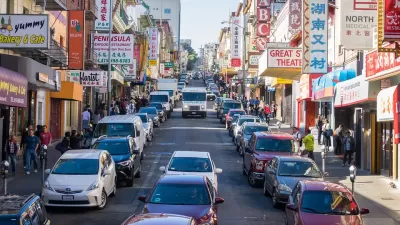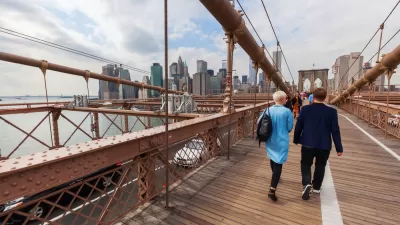An opinion piece by Josh Wilson makes a case for a congestion pricing plan tailored specifically for the realities of living and working in San Francisco.

"Safer streets, less pollution, better transit, bustling business districts — San Francisco can have it all," writes Josh Wilson to open an opinion piece published recently by the San Francisco Chronicle.
But like many other cities around the state and the country, increased amounts of driving and reduced transit ridership are producing congestion, carbon emissions, and air pollution. "Something needs to change, and somebody has to pay," concludes Wilson. "Congestion and zone pricing offer a path forward."
Interestingly, Wilson brackets land use as a means to the solutions sought by congestion pricing by mentioning the political and bureaucratic quagmire of planning and development policy in the city: "One solution is to build around transit rather than automobiles, but that process is bogged down in the eternal battle between preservationists and pro-density developers. We need to raise the stakes while they get their issues sorted out."
A key theme throughout the opinion piece is the specificity of the proposed congestion pricing plan. The proposal targets specific streets, with specific concession made for certain kinds of drivers, and concern for specific outcomes that could be desired less desirable consequences of a congestion pricing scheme.
As noted by Wilson, "touristy Lombard Street and hustling, bustling Market Street" are under consideration as test cases for congestion pricing, following in the footsteps of New York City in implementing a transportation policy previously only encountered in European cities. The Overton window for congestion pricing has also opened in other U.S. cities like Chicago, Seattle, and Los Angeles in recent months.
FULL STORY: San Francisco needs congestion pricing — and not just for downtown driving

Planetizen Federal Action Tracker
A weekly monitor of how Trump’s orders and actions are impacting planners and planning in America.

Congressman Proposes Bill to Rename DC Metro “Trump Train”
The Make Autorail Great Again Act would withhold federal funding to the system until the Washington Metropolitan Area Transit Authority (WMATA), rebrands as the Washington Metropolitan Authority for Greater Access (WMAGA).

The Simple Legislative Tool Transforming Vacant Downtowns
In California, Michigan and Georgia, an easy win is bringing dollars — and delight — back to city centers.

The States Losing Rural Delivery Rooms at an Alarming Pace
In some states, as few as 9% of rural hospitals still deliver babies. As a result, rising pre-term births, no adequate pre-term care and "harrowing" close calls are a growing reality.

The Small South Asian Republic Going all in on EVs
Thanks to one simple policy change less than five years ago, 65% of new cars in this Himalayan country are now electric.

DC Backpedals on Bike Lane Protection, Swaps Barriers for Paint
Citing aesthetic concerns, the city is removing the concrete barriers and flexposts that once separated Arizona Avenue cyclists from motor vehicles.
Urban Design for Planners 1: Software Tools
This six-course series explores essential urban design concepts using open source software and equips planners with the tools they need to participate fully in the urban design process.
Planning for Universal Design
Learn the tools for implementing Universal Design in planning regulations.
Smith Gee Studio
City of Charlotte
City of Camden Redevelopment Agency
City of Astoria
Transportation Research & Education Center (TREC) at Portland State University
US High Speed Rail Association
City of Camden Redevelopment Agency
Municipality of Princeton (NJ)





























